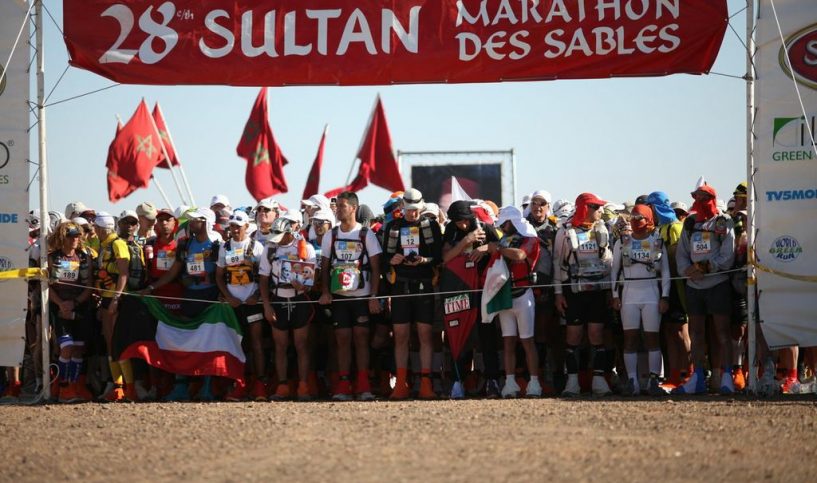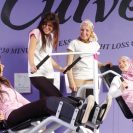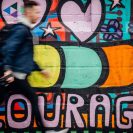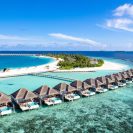I first met Mohammad Al Matar, a Captain with the Armed Forces of Kuwait, in 2011, at a race. It was my duty to record the peoples bib numbers and times at which they crossed the finish line. It sure did not help that 4 people crossed the finish line simultaneously for first place, which meant we needed a random draw for first place. Luckily Mohammed went on to win.
Over the course of the next few months, we would become closer friends and I would see his determination and passion for the sport of running. Mohammed would spend most of his time traveling, honing his skills as a runner, and with great reward. He came in first place at the North Face 25KM Jungle Run in Thailand, 3rd place in the 10.5KM Bank Mascat Asalah Marathon 2013 race, 5th place in the Donut 10 Mile race in Dubai, as well as other incredible timings in races in such locations as Jordan, Ras Al Khaimah, Abu Dhabi and Cyprus, to name a few.
Mohammad Al Matar’s crowning achievement however, lies in his latest endeavor, a return to the fabled sands of Morocco to participate in what is known as the toughest footrace on earth, the Marathon Des Sables (MDS). In its 28th edition, it is a 250KM ultra-marathon through the Sahara Desert bringing together 1,000 runners from 50 different countries.
Divided into 5 stages over 5 days of varying distances – the greatest being 75.7KM this year – it is a test of self-sustenance as runners must carry their own supplies upon their backs from one checkpoint to the next, adding an extra 6-10KG to their own weight as they race across the desert plains of sand dunes, rocky plateaus, valleys and mountains. It is an arduous journey and not for the faint of heart. 2 people have died since 2007 at the event, and one was lost for 9 days in the desert.
At night they camp out in tents like nomads with nothing but the stars for comfort as they dwell upon the long journey lying ahead the next day. Temperatures range from 10°C at night to 40°C during the daytime. Billowing winds and blowing dust further exacerbate the running conditions.
This year, 29 year old Mohammed Al Matar teamed up with last year’s first place winner at the MDS, Salameh Al Aqra and their teammate Mohammad Al Swaiti as the Jordanian & Kuwaiti Team, and giving the Arab World reason to rejoice by placing third.
My first question is… why?
It was an adventure. To be honest, I wanted to see what my countrymen had meant about how difficult this race was. It was not my specialty, I had not run ultra-marathons ever before, but I wanted to improve the image of the Kuwaiti sportsman. 5 other Kuwaitis had previously participated in 2009, positions in the 700s, I wanted to be ready by eating right, with the right equipment and light training in distances of 10KM and 21KM.
You were part of the first team to run from the northern border of Kuwait to the south, how much distance did you cover, and did it ignite your passion for ultra-marathon running?
I registered for MDS 2012 before the Run Kuwait event. Our training for Run Kuwait was running, walking and light gear. While attending a separate training camp in Jordan I met my Jordanian friends who motivated me and taught me things I never knew. They informed me of MDS.
How do you prepare yourself mentally and physically for a race like this?
Physically, I did distance training, nothing above 20KM, I focused more on speed. My army background prepared me for running and carrying my own equipment on my back, it also helped me as I did not blister like the others did. Mentally it was my love for my country. I was there to represent Kuwait, I was supported by the Army, and my competition motivated me, each representing their respective countries with some who have been taking part in the race for more than 2 years in a row. I was proud to have people know I was from Kuwait when they learned of my accomplishments. Despite everything I saw in 2012 I returned in 2013 and remained competitive, I did not drop out. I could not allow myself to drop out, even though I was tired. The race, despite being physically exhaustive, takes its toll on you mentally as well. You keep thinking – I am tired, I want to eat, my feet hurt and then you think about the sponsors. Once you are done with your thoughts you need to gather firewood and cook your own food, which was bland and had no taste, it was just consumed for energy. The later you get to the finish line, the further you have to walk to find firewood, as others who got there earlier get the closest, making you even more tired. I wanted to finish the race so as not to go crazy.
How did it feel being the sole representative of Kuwait?
It would have been nice to have someone to support from my own country and to gain strength from.
What was your biggest obstacle throughout the race?
The heat, and the mountains. Last year the path taken was not as mountainous, and they were not as huge or dangerous as this time. The paths were extremely narrow, crooked and steep. The very next day I said to myself that I was no longer interested in getting a good time or position, I was only worried about surviving and not losing my life on the mountain. I never trained on mountains. I had no experience with them. It is a mountain not fit for running. Rocks would slide down towards oncoming runners from those attempting to get across. It was very dangerous.
How was the competition?
Seeing competitors from foreign lands was in itself a motivation – people leaving their comfortable lives for a week-long perilous journey in the desert. We all shared a sense of adventure, and it was comforting to see familiar faces from 2012 returning in 2013. It motivated me.
Is there anything you would have done differently?
My biggest obstacle was distance. It was not my forte. In Kuwait and in the Army I did not do long distance training. I run for Qadsiya Sports Club and even there my friends told me that my training was incorrect as I was doing 10KM and 21KM speed runs and attempting MDS which is an ultra-marathon. I was not an ultra-marathoner. I should have trained distances, however it was difficult because at both the Army and the Club I was doing speed. My competitors were shocked when they saw my rank and realized I was not an ultra-marathon runner. I was driven by determination.
How did you feel when you crossed the finish line?
The first thing I did was thank God for carrying me across the finish line after the fatigue I had endured and the stress. I was not only running for myself, I was representing all of Kuwait, it was a heavy burden and I felt utter relief at finishing strong, carrying the hopes and the name of Kuwait. I crossed the finish line as a winner not a finisher, unfurling the Kuwaiti flag and taking comfort in seeing a small piece of home. All my efforts and training were not in vain. I funded my own training, traveling around the world at my own expense to participate in races to make myself better and to promote Kuwait on the international running circuit. I always was a winner and did Kuwait proud with no sponsorship, attention or care.
Compare between the first time you ran the race in 2012 and now? How is it different?
In 2012 I ranked 46, in 2013 I was 85. First time I placed top 50, second time I was very proud my team made third place. This year I was able to stand on the podium with my team mates as we came 3rd as a team (Salameh Al Aqra, Mohammad Swaiti and me), and the Kuwaiti flag flew in front of 1000 competitors and millions of spectators around the world.
What advice would you give to someone thinking of participating in an ultra-marathon?
Train. It is not an easy run; it is the equivalent of 4 marathons. No matter how hard you train, during your first ultra-marathon you will feel your body giving up on you. Once you pass that and endure, you are ready to call yourself an ultra-runner, and will cross the finish line as a winner.
What future do you see for ultra-marathon running in Kuwait?
I left a legacy for any proud son or daughter of Kuwait wishing to participate. They will be recognized and respected as the people now know of the tenacity of the Kuwaiti people.
Marathoners are known to have an extra gear they tap into, when most people would otherwise give up…has this ever happened to you, and if so, where does the strength come from to carry on?
As I mentioned before, ultra-marathons are a test of endurance. I was not going to MDS to waste time. I was there to represent my country, despite my competition having superior training and longer time to train, I made up for it with my determination, my belief in myself and my will to see Kuwait’s name echoed in the sport of ultra-running. I had to continue to see the final result. No rest until the finish line. The Army taught us that after fatigue there is peace; fatigue can be forgotten as victory is forever. One of the sayings I kept repeating over and over was taught to me in the Army, “follow me if I lead, push me if I stop, bury me if I give up”. My greatest source of strength also came from the accolades received from my teammates, season ultra-runners and multiple time competitors at MDS.
Is there anyone you would like to thank for helping you achieve the seemingly impossible by taking place in this race twice?
I would like to thank the Minister of Defense and the Chief of Army of Kuwait for allowing me to participate in this event of international stature and giving me the honor of holding high the flag of this beautiful country.











